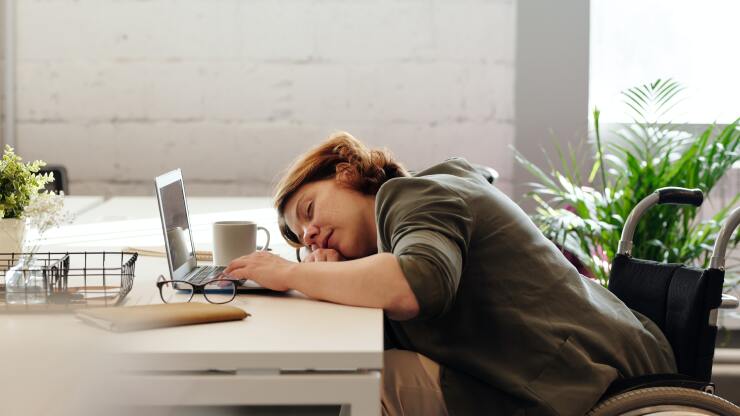How much sleep an employee gets at night is directly related to how much work they get done during the day. How can employers help them find the healthiest balance?
Approximately 38% of workers are struggling through
"Sleep is a huge missing piece of the performance puzzle at work, and can unlock unprecedented levels of performance," says Jacinta Jiménez, vice president of coaching innovation at virtual coaching platform BetterUp. "At the end of the day, sleep is a biological imperative. It is as vital as food and water, and even small deficits can have major impacts, mentally and physically."
Read more:
And yet, sleep is far from a mainstream workplace issue, though organizations like BetterUp are working to change that, and bring
"The silver lining of COVID is that it shined a spotlight on the importance of well-being at work, and that we can't keep our physical or mental health separate from our work performance," Jiménez says. "I'm hopeful that sleep could finally be getting the attention it deserves in the realm of work."
The CHRO recently spoke with EBN about why BetterUp has added sleep coaches to its platform's roster of experts, how organizations can support better health for their teams, and what that commitment should look like on the executive level.
As an HR professional, what has the traditional take on sleep been in most workspaces, and how is it changing?
In the past, I think there's been this idea of busy-ness as a badge of honor. Pushing through and pushing ourselves to be always on and connected meant that we were devoted to our work. But that over-focus on productivity came at the expense of really not even having conversations about sleep or rest and making it taboo. Traditionally getting rest made it look like you weren't performing. But with that shift with COVID, people are more open to talking about well-being now, and they're also realizing that their physical well-being and sleep is so intimately tied to their performance at work. Prior to that it was "Let's pull all nighters, let's continue to cram," and the research shows that that just doesn't work. It actually backfires.
Under-slept employees are not going to drive the business forward with innovation, for example, because when you're not getting enough sleep, you work less productively. Ironically, employees who are working less productively need to work longer, which means they're working later and getting less sleep. Which is when people will often say they don't have enough time to sleep, because they have so much work to do when if they'd been encouraged to sleep more, they'd be more productive and have less work to do. So it used to be this downward spiral that I think people are finally addressing and understanding that if employers can prioritize rest, their teams are not going to be as susceptible to burnout and turnover.
What is the role that HR and employers are going to have to play in making sure that their employees are getting the rest that they need to work productively?
It is a two-way street. An individual can only do so much by fixing their sleep habits, because individuals exist in the system of work. Managers can support them in one of several ways. One thing is investing in a sleep friendly infrastructure. Natural light is really important — human beings are not machines, we're wired to respond to light. Exercise is really important, as well as easy access to nutritious food. For those working remote or hybrid workers, this can be helped by encouraging employees to take a walk during the day and get outside when they can.
Read more:
Overall, we have to put boundaries around work hours. It's so important that we're not answering emails at night or staring at bright screens. Having too much blue light can keep our brains awake to create new worries, anxieties and stress. Flexible schedules are another way to offer support, because not everyone has the same kind of sleep style — some people are night owls naturally and others are morning larks that are able to just wake up in the morning and start working. More flexible workplaces allow for people to really lean into their unique sleep style, that they're genetically predisposed to and be able to actually take advantage of rest.
Finally, why not incorporate sleep into learning and development? Teach employees about sleep hygiene and send the message you understand this is an important aspect of productivity and workplace mental health. The starting place is just really getting leadership to buy in and understand that this is critical.
Does flexibility include allowing employees to build napping into their schedules?
Yes, especially if they're done well. There's a lot of technical research around napping. For example, 26-minute naps lead to a 34% improvement in task performance, and a more than 50% increase in overall alertness. Allowing flexibility for naps and setting up parameters or guidelines on how to take the right kind of nap could be huge for employees.
BetterUp added designated sleep coaches to their staff that clients' employees can access through the platform. How do these coaches help with fixing their sleep schedule?
There's a lot of education that has to come into place around employees' perceptions around sleep. Being able to really talk about all the benefits based on science, and also talk about sleep hygiene and healthy sleep habits help ensure a good night's sleep. Everyone has a unique style of sleeping or relationships with sleep, and having a coach can really help personalize it for the individual so that they can really make their own and make sure that it feels like it's taking in all the unique circumstances, environments, cultures and personalities that they all bring with them. Sleep can not be a one-size-fits-all-approach.






